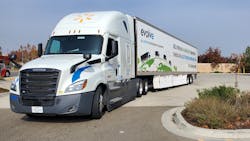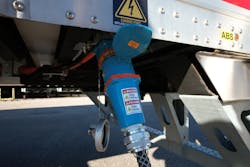Thermo King’s Walmart partnership makes big stage
Thermo King recently spotlighted its groundbreaking partnership with Walmart, the world’s largest grocery retailer, to test battery-electric refrigerated trailers during the invitation-only UP.Summit in Arkansas.
Thermo King late last year worked with Walmart on its first trial of refrigerated trailers operating on battery electricity in the U.S. During the two-month trial, Walmart ran 18 routes hauling groceries between its distribution center in Shafter, California, and stores in surrounding areas, with “exciting” results, according to Thermo King. This included running on electricity 83% of the time throughout the pilot and collecting data that will enable further development of the technology and, ultimately, help move the industry forward.
“Thermo King was honored to be part of the 2022 UP.Summit, where next-generation vehicles, interactive technology, demonstrations, and breathtaking flyovers were featured by some of the world’s most dynamic thinkers, doers, and investors representing all facets of mobility and the future of transportation,” according to a Thermo King statement.
Fernando Cortes, Walmart’s senior vice president of transportation, said in a recent post the electric reefer trial is part of its strategy to achieve zero emissions across the company’s global operations by 2040. Walmart also is evaluating natural gas and hydrogen solutions in its over-the-road and yard truck fleets. The company operates one of the largest fleets in the U.S.—with 12,000 drivers, 10,000 tractors, and 80,000 trailers.
With a fleet of that scale, transportation accounted for about 24% of Walmart’s Scope 1 emissions in 2020, according to Cortes.
Of those 80,000 trailers, 10,000 are reefers, which today rely on diesel power to chill products, contributing to the company’s total CO2 emissions. Trailers cooled by electric transport refrigeration units (TRUs) that can switch to diesel mid-haul if the batteries are depleted could help lower those emissions, Cortes said.
“Becoming a zero-emissions company won’t be as simple as adopting electric alternatives,” he concluded. “For some vehicle classes, the solution might look like a hydrogen-fueled yard truck moving an electric refrigerated trailer, which eventually gets transported by a natural gas-powered truck. Our hope is that by testing and learning, we can find the right recipe to reduce greenhouse gas emissions and create a less impactful transportation fleet—all while still delivering the freshest food and goods to our customers.”

